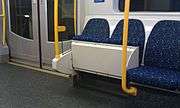Sydney Trains M set
| Millennium Train | |
|---|---|
|
Millennium set at Sydney Central | |
|
Vestibule of a Millennium carriage looking towards gangway | |
| In service | 2002–present |
| Manufacturer | EDI Rail |
| Built at | Cardiff Workshops |
| Constructed | 2002–2005 |
| Entered service | 2002-2005 |
| Number built | 141 |
| Number in service | 141 |
| Formation | 4 car sets |
| Fleet numbers | D1001-D1073, N1501-N1573 |
| Capacity | 104 in driver trailers, 122 in motor cars |
| Operator(s) | Sydney Trains |
| Depot(s) | Eveleigh |
| Specifications | |
| Car length | 20.532 m (67 ft 4 in) |
| Width | 3.03 m (9 ft 11 in) |
| Height | 4.381 m (14 ft 4 in) |
| Maximum speed | 130 km/h (81 mph) |
| Weight | 45.5 tonnes (44.8 long tons; 50.2 short tons) |
| Traction system | 4 x 226 kW (303 hp) ALSTOM 3 phase induction motors per motor coach |
| Electric system(s) | 1,500 V DC catenary |
| Current collection method | pantograph |
| Braking system(s) | automatic air, electropneumatic, regenerative, rheostatic |
| Track gauge | 1,435 mm (4 ft 8 1⁄2 in) standard gauge |
 |
M Set Service termination DVA
The Digital Voice Announcement played when the next station is a terminus stop preceded with a warning alert chime. |
| Problems playing this file? See media help. | |
The Sydney Trains Millennium or M sets are a class of electric multiple unit operated by Sydney Trains in Sydney, New South Wales, Australia. The fourth generation trains entered service from 1 July 2002[1] after short delays due to electrical defects.[2] The trains can operate over the entire suburban network, but currently only operate on Sector 2.
The Millennium trains replaced the aging 1960s Tulloch trailers and provided extra capacity on the CityRail network.
Design
The Millennium train, like the Tangara, is a double decker. It is a four car consist, with the middle two cars being non-control motor cars and the two outer cars being driving control trailer cars fitted with the pantograph.[3] The Millennium train is equipped with an AC drive system, whereas the Tangara has a DC drive system. The sets usually operate in eight car formations with two four car sets combined.
While the Millennium train concept is an evolution of the Tangara concept (manufactured by A Goninan & Co), the Millennium train introduced new features such as internal electronic destination indicators, automated digital voice announcements (DVA) for upcoming stops, a return to reversible seating, surveillance cameras, wider stairways, a new safety yellow colour scheme, and push-button opened internal doors. The Millennium Train also introduced crumple zones to absorb impact in a collision. Carriage interiors were designed by Transport Design International [4]
The Millennium train also features Scharfenberg couplers
Delivery
The cars were constructed by EDi Rail at Cardiff Workshops. The contract included a 15-year maintenance agreement with EDi Rail to maintain the trains at a specialised maintenance centre at Eveleigh. During testing and initial revenue service, they ran as four car sets, with eight car sets commencing service towards the end of 2002 after further testing. All 35 four car sets were delivered by October 2005.
The initial order signed in October 1998 was for 81 carriages, in December 2002 an option was taken up for an additional 60.[1]
Criticisms
The Millennium trains were criticised for having several technical problems and causing problems with the CityRail network; they were referred to in the media reports as The "Mi-lemon" and "Millenni-Bug" as a result. Some of the problems were caused by insufficient power supply on the overhead to cope with the power demands of the more technologically advanced trains causing them to shut down. Software bugs also contributed to the trains' poor reliability.
The Millennium trains were withdrawn from service in April 2003 while the problems were being rectified and a full audit was carried out.[1] They were subsequently reintroduced into service in June 2003 and have since been operating on Sector 2.
In service
External Carriage Camera Trial

In late 2008 some trains were fitted with external cameras atop of carriages near the doors, testing their use for the then-future Waratah trains. These cameras were subsequently incorporated into the final design of the Waratah train.[5]
Lines serviced
The Millennium trains typically operate on the following lines:
- Airport, Inner West & South Line: City Circle to Macarthur via Airport/Sydenham; City Circle to Leppington via Granville
- Bankstown Line: City Circle to Lidcombe/Liverpool via Sydenham and Bankstown
- Carlingford Line: Clyde to Carlingford
- Olympic Park Line: Lidcombe/City to Olympic Park
Gallery
- M-set interior gallery
-

Upper deck
-

Lower deck
-

Stairs leading from vestibule to upper deck, including emergency help button and speaker facilities
-

Vestibule looking towards carriage doors and stairs leading to upper and lower decks
-

At least two seats in each vestibule seating area can be folded up to park prams, wheelchairs, mobility vehicles or bicycles.
-

End Carriage Vestibule
References
- 1 2 3 RJ Sendt (June 2003). "Performance Audit - The Millennium Train Project" (PDF). The Audit Office of New South Wales. Retrieved 24 September 2007.
- ↑ Darren Goodsir (16 April 2002). "Signal failure? No, it's just the Millennium train picking up steam". Sydney Morning Herald. Retrieved 31 August 2011.
- ↑ Millennium CityRail
- ↑ "millennium". Axis Communications. Retrieved 20 July 2013.
- ↑ Platform Guards Irrelevant Ecotransit
Further reading
- Beckhaus, John; Halgren, Stephen (2007). Sydney's Electric Trains. Australian Railway Historical Society NSW Division. ISBN 978-0-975787-08-3.
External links
 Media related to Sydney Trains M set at Wikimedia Commons
Media related to Sydney Trains M set at Wikimedia Commons- Technical diagrams and specifications

